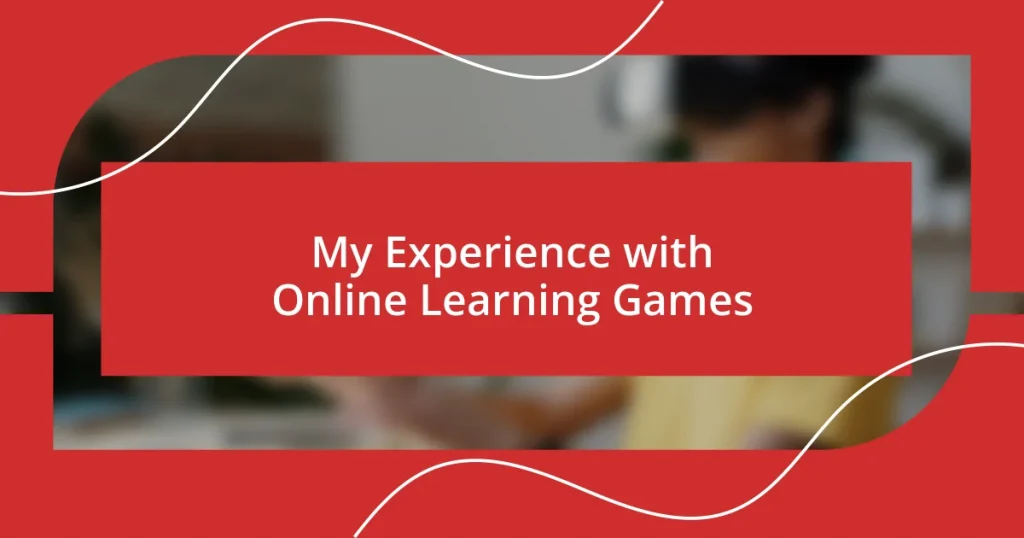Key takeaways:
- Online learning games enhance engagement by making complex subjects enjoyable and fostering active participation through interactive gameplay.
- Choosing the right games aligned with personal learning goals, educational value, and user feedback is crucial for maximizing the learning experience.
- While online games offer significant benefits, challenges such as overwhelming choices, technology issues, and misalignment with learning styles can hinder their effectiveness.
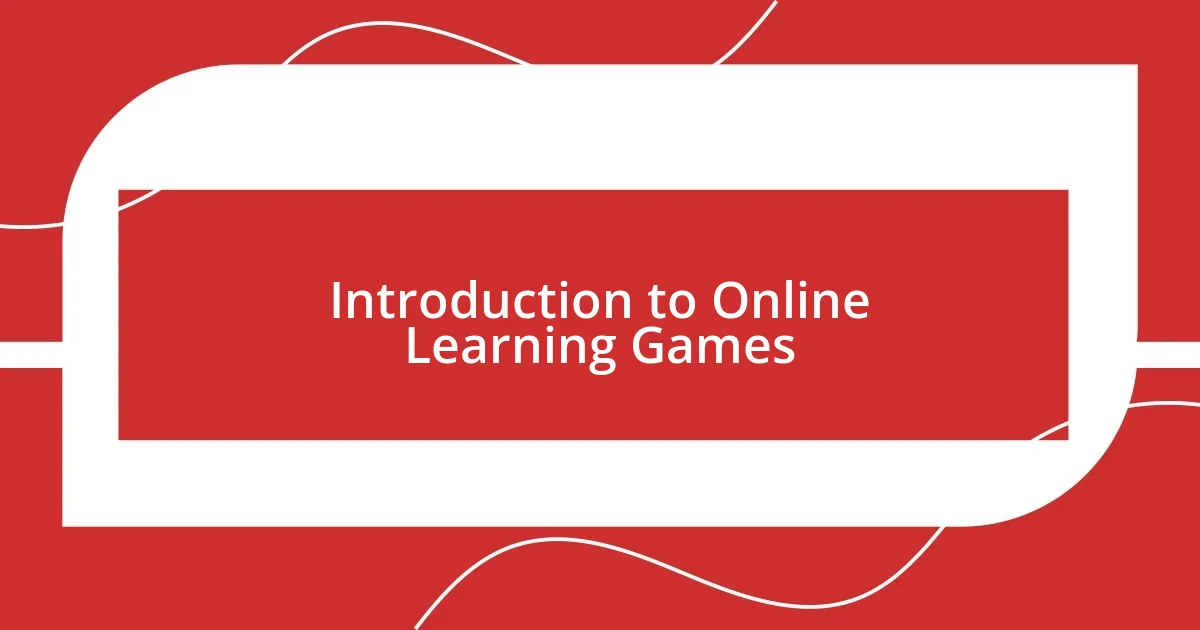
Introduction to Online Learning Games
Online learning games have emerged as a dynamic and engaging educational tool, transforming the way we approach learning. I remember the first time I tried a math game that turned complex equations into a competitive challenge; it felt like a lightbulb moment where the pressure of traditional studying melted away. Isn’t it fascinating how games can make even the most daunting subjects feel approachable?
These games create a unique blend of fun and education, fostering an interactive environment that encourages exploration. I’ve often found myself immersed in science simulations that were not just informative but downright thrilling. Have you ever felt that rush when you grasp a new concept while having fun? It’s a powerful reminder that learning doesn’t have to be a chore.
The key lies in their ability to captivate us, catering to different learning styles and keeping motivation levels high. I vividly recall playing a vocabulary game that effortlessly expanded my word bank while I was simply trying to beat my own score. How often do we underestimate the value of play in education? It’s these experiences that highlight the potential of online learning games to create memorable, impactful learning journeys.
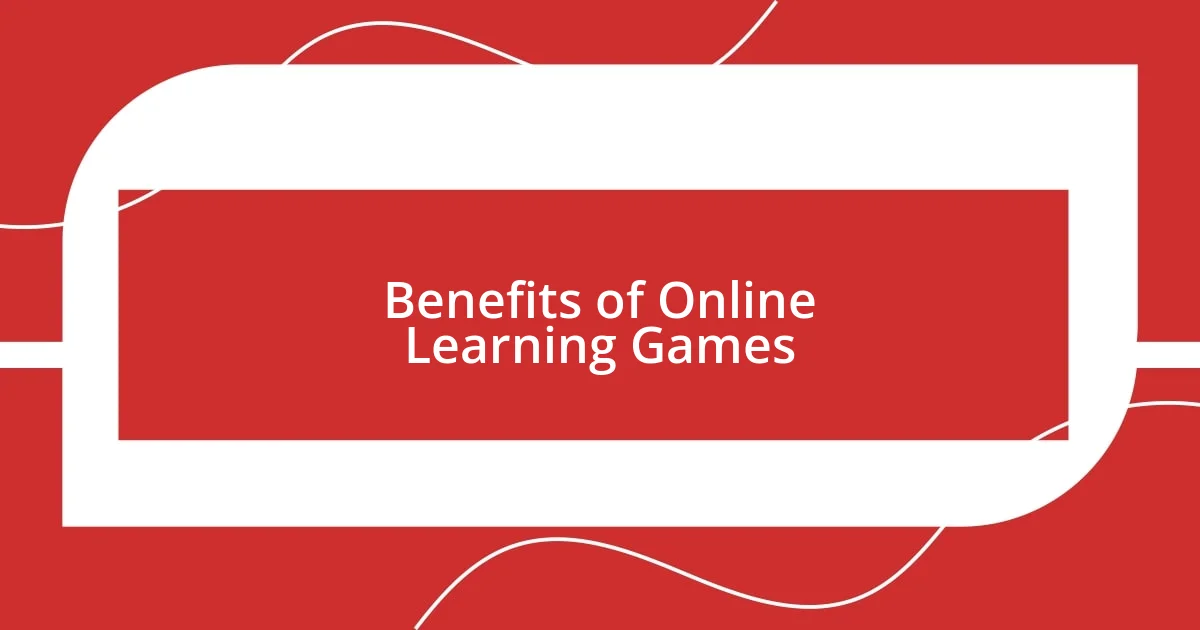
Benefits of Online Learning Games
Online learning games offer a remarkable advantage by fostering active participation. I often reflect on an online history quiz game that not only tested my knowledge but also ignited my curiosity about events I had never explored. The thrill of competition paired with the satisfaction of seeing my scores improve kept me coming back for more. Have you ever found yourself wanting to learn just to level up?
Moreover, these games often incorporate instant feedback, which enhances the learning experience. I can’t forget the way my heart raced each time I received immediate results on a science experiment simulation I was trying. It was as if I could feel each success boosting my confidence and every mistake transforming into a lesson learned. Isn’t it incredible how real-time responses can turn errors into stepping stones for deeper understanding?
Additionally, they provide a flexible learning environment, catering to individual schedules and learning paces. When I was juggling work and studies, I turned to educational games that allowed me to learn whenever I had a spare moment. The freedom to choose when and how to engage was liberating. What have been your experiences with finding time for learning amidst life’s chaos?
| Benefit | Description |
|---|---|
| Active Participation | Encourages engagement through interactive gameplay. |
| Instant Feedback | Provides immediate results, fostering quick learning and improvement. |
| Flexibility | Allows learners to study at their own pace and on their own schedule. |

Selecting the Right Online Games
Selecting the right online games can significantly enhance your learning experience. I remember feeling overwhelmed when faced with countless choices, but I quickly learned the importance of aligning games with my learning objectives. A good fit between the game’s content and my personal goals transformed my study sessions into exciting adventures rather than mundane tasks. When you find a game that resonates, the joy of learning is magnified.
Here are some essential factors to consider:
- Educational Value: Ensure the game teaches relevant concepts or skills.
- Engagement Level: Look for games that keep you excited and curious.
- User Reviews: Check feedback from other players to gauge effectiveness.
- Age Appropriateness: Make sure the content is suitable for your learning level.
- Skill Development: Opt for games that focus on skills you wish to improve.
By evaluating these aspects, you’ll more confidently choose games that not only challenge you but also cultivate a deeper understanding of the material. It’s like finding a perfect book that speaks to you; once you discover that connection, the lessons unfold effortlessly.

Engaging with Online Learning Communities
Engaging with online learning communities has been a game changer for me. I remember joining a forum dedicated to educational games, where I could share my thoughts and strategies with others. The sense of camaraderie made learning feel less isolating; it’s as if we were all on a collective quest for knowledge, inspiring each other to dig deeper. Have you ever felt energized just by being part of a vibrant community?
Participating in live discussions about game mechanics and educational content allowed me to see different perspectives that I hadn’t considered. One time, a fellow player shared a tip on how to tackle a particularly tricky level in a math-based game, which clicked with my learning style. It reminded me that collaboration can often bridge gaps in understanding. Can you recall a moment when a simple conversation led to a breakthrough in your learning journey?
Moreover, I found that these communities often organize challenges or competitions that motivate me to excel. I joined a month-long trivia contest filled with enthusiastic learners, and the spirit of friendly competition intensified my desire to master the material. The joy of celebrating each other’s victories felt like a collective win for knowledge. Isn’t it fascinating how a supportive environment can elevate our learning experiences?
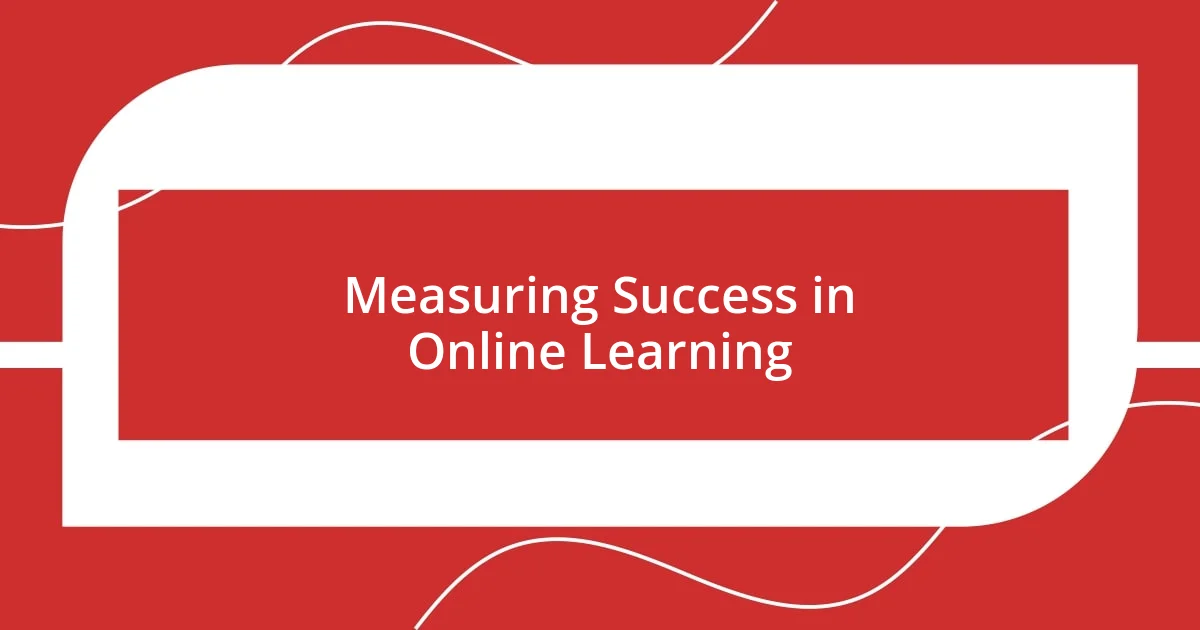
Measuring Success in Online Learning
Measuring success in online learning can be quite subjective, but I’ve found a few key indicators that resonate with my experiences. One of the most telling signs for me is how much I can apply what I’ve learned in real-life scenarios. For instance, after playing a simulation game about economics, I noticed I could actually explain supply and demand during a discussion with my friend. That connection between gameplay and practical knowledge felt immensely rewarding.
Another important aspect is self-assessment. I often take the time to reflect on my progress after each learning session. Did I feel engaged? Did I grasp the concepts well? Recently, I started using a simple journal to jot down my thoughts after each game. This way, I not only track my progress but also recognize patterns in my learning preferences. It’s a process that adds depth to my understanding and boosts my confidence.
Finally, I think examining the feedback from the games themselves plays a crucial role in measuring my success. Many games provide instant feedback, showing areas where I’ve excelled and where I can improve. I remember one game that even offered tailored challenges based on my performance, which pushed me just enough out of my comfort zone. How incredible it is to have tools that guide your growth in such a tailored way, don’t you think?
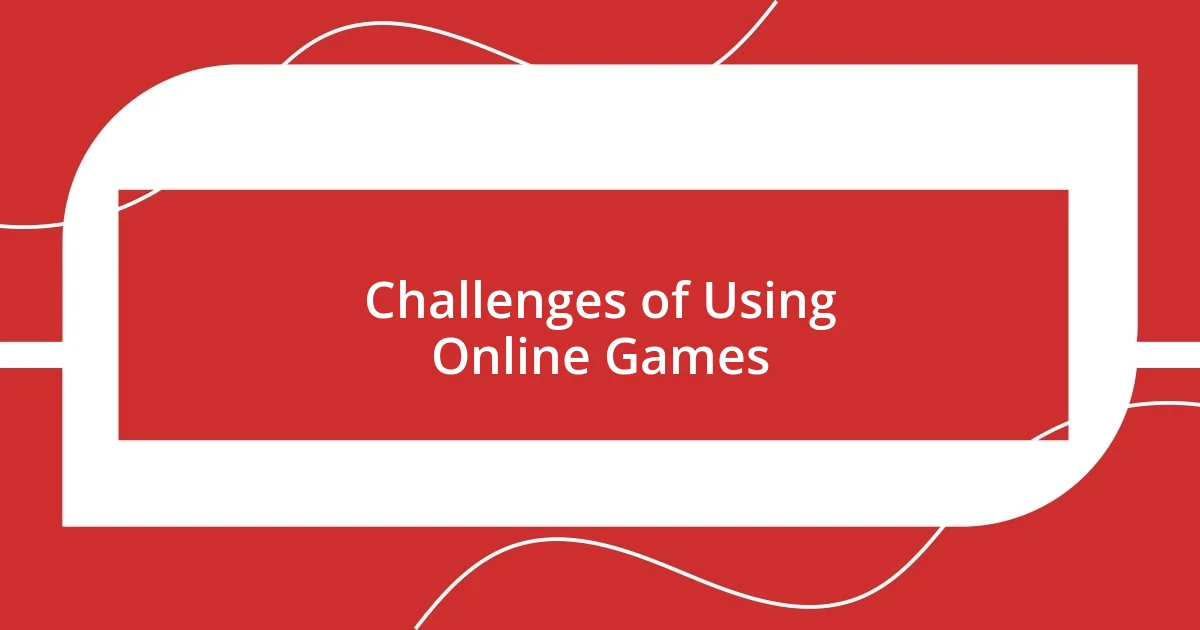
Challenges of Using Online Games
Using online games in education certainly comes with its fair share of challenges. One experience that stands out to me is the overwhelming number of options available. When I first dove into online learning games, it felt like being a kid in a candy store. With so many choices, I hardly knew where to start, leading to analysis paralysis. Have you ever faced a similar dilemma, where the abundance of possibilities made it tough to make a decision?
Another significant hurdle I encountered was the issue of technology. I remember the frustration I felt during a particularly important gaming session when my connection dropped right in the middle of a lesson. That disruption not only derailed my focus but also left me feeling disconnected from the learning experience. It’s a reminder that our reliance on technology can sometimes backfire, creating barriers instead of facilitating engagement.
Lastly, I’ve noticed that not every game aligns with my learning style. For instance, I once played a language-learning game that emphasized vocabulary memorization through repetitive drills. While some learners thrive in that environment, I found it stifling. I think this highlights an essential question: How do we ensure that the games we choose cater to our individual preferences and promote genuine learning? Finding the right fit can be as challenging as it is crucial for success.









